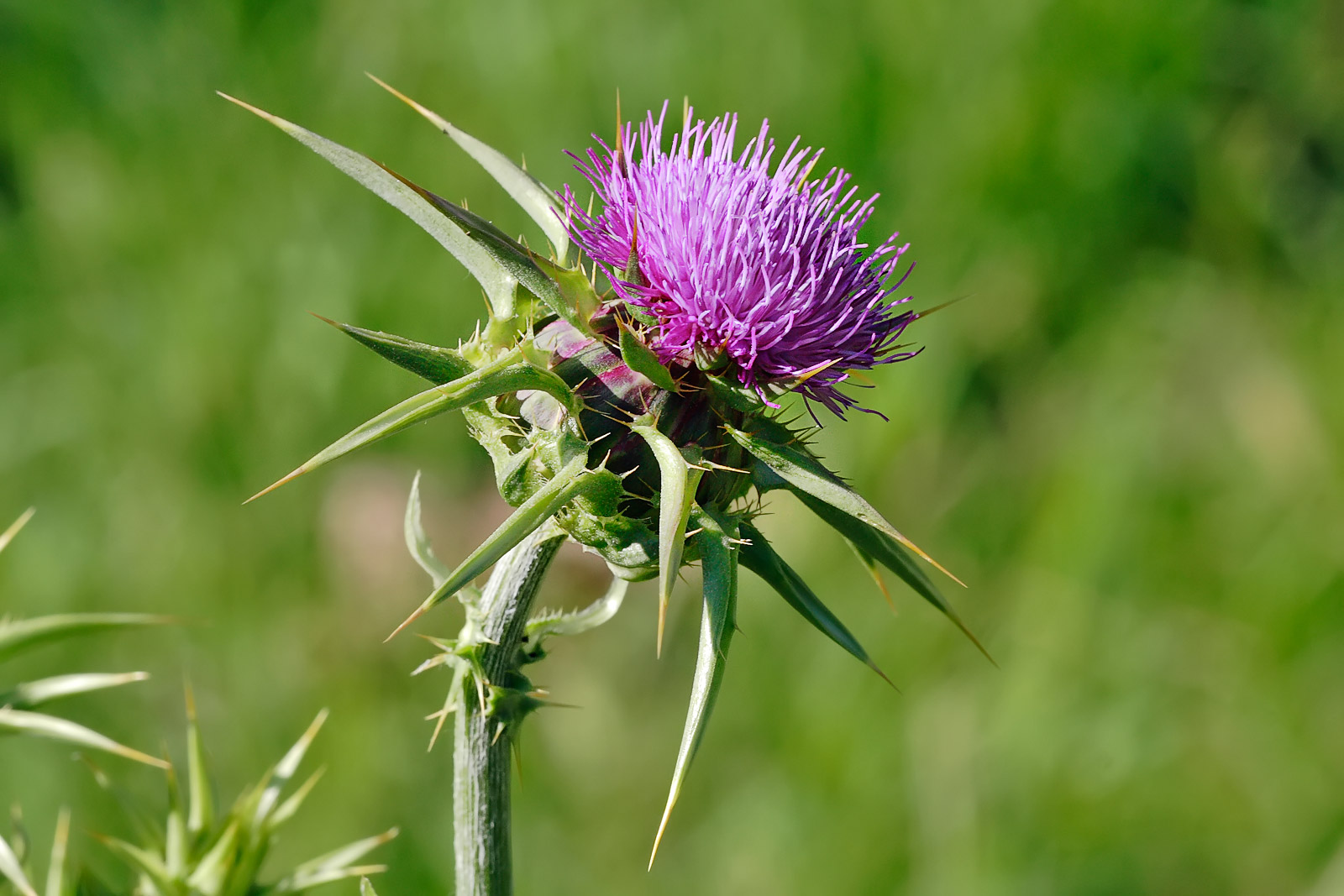Milk Thistle (Silybum marianum): The Liver-Protective Herb
Milk thistle (Silybum marianum) is a flowering plant that has been used for centuries as a natural remedy for various health conditions, with its primary focus on liver health. With its striking appearance and numerous potential benefits, milk thistle has gained popularity as an herbal supplement. In this article, we will explore the fascinating world of milk thistle, including its history, botanical features, traditional uses, and potential health benefits.
History and Botanical Features:
Milk thistle has a rich history dating back to ancient times. The plant is native to the Mediterranean region but is now cultivated worldwide for its medicinal properties. The name "milk thistle" is derived from the milky white sap that is released when the plant's leaves are crushed. The botanical name, Silybum marianum, is believed to come from the Greek word "silybos," meaning "hairy," referring to the plant's prickly leaves.
Milk thistle is a member of the daisy family (Asteraceae) and is characterized by its tall stem, large spiky leaves with white veins, and vibrant purple flower heads. These flower heads contain small, hard-skinned fruits known as achenes, which house the seeds. It is the seeds of milk thistle that are primarily used for their medicinal properties.
Traditional Uses:
Milk thistle has a long history of use in traditional medicine systems, including Ayurveda and Traditional Chinese Medicine. Here are some of its notable traditional uses:
1. Liver Support: Milk thistle has been traditionally used as a liver tonic to support liver health and promote liver regeneration. It is believed to have hepatoprotective properties, helping to protect the liver from toxins and damage.
2. Detoxification: The liver plays a crucial role in detoxifying the body by filtering out harmful substances. Milk thistle is thought to enhance liver detoxification processes and assist in removing toxins from the body.
3. Digestive Health: Milk thistle has been used to support digestive health and promote healthy digestion. It is believed to help alleviate symptoms of indigestion, bloating, and flatulence.
4. Gallbladder Health: Milk thistle is also known for its potential to promote gallbladder health. It may help improve bile flow and prevent the formation of gallstones.
Potential Health Benefits:
1. Liver Protection: Milk thistle is best known for its liver-protective properties. It contains a bioactive compound called silymarin, which is a complex of flavonolignans with potent antioxidant and anti-inflammatory effects. Silymarin has been shown to protect liver cells from damage caused by toxins, alcohol, medications, and certain diseases.
2. Liver Regeneration: Studies suggest that milk thistle may promote the regeneration of liver cells, which is vital for maintaining liver health and function. It may help speed up the healing process in cases of liver damage or liver disease.
3. Antioxidant Activity: Silymarin in milk thistle exhibits strong antioxidant activity, helping to neutralize harmful free radicals in the body. This antioxidant capacity contributes to overall cellular health and may offer protection against chronic diseases.
4. Anti-Inflammatory Effects: Milk thistle's anti-inflammatory properties can help reduce inflammation in the liver and other parts of the body. Chronic inflammation is associated with various health conditions, and milk thistle may help mitigate this inflammatory response.
5. Cholesterol Management: Some studies suggest that milk thistle may have a positive impact on cholesterol levels by reducing LDL ("bad") cholesterol and increasing HDL ("good") cholesterol. This effect may contribute to cardiovascular health.
6. Diabetes Support: Milk thistle may aid in managing blood sugar levels in individuals with diabetes. It may help improve insulin resistance and regulate glucose metabolism.
7. Skin Health: Milk thistle has been used topically to promote skin health. Its antioxidant and anti-inflammatory properties may help reduce skin damage caused by oxidative stress and inflammation.
8. Cancer Prevention: Preliminary research suggests that milk thistle may have anticancer properties, inhibiting the growth of cancer cells and reducing the risk of certain types of cancers. However, more extensive studies are needed to validate these findings.
Safety Considerations:
Milk thistle is generally considered safe when used as directed. However, there are a few important safety considerations to keep in mind:
1. Allergies: Some individuals may be allergic to milk thistle or plants in the Asteraceae family. If you experience any allergic reactions, such as itching, rash, or difficulty breathing, discontinue use and seek medical attention.
2. Drug Interactions: Milk thistle may interact with certain medications, including anticoagulants, antidiabetic drugs, and immunosuppressants. Consult with a healthcare professional before using milk thistle if you are taking any medications.
3. Pregnancy and Breastfeeding: Limited research is available on the safety of milk thistle during pregnancy and breastfeeding. It is advisable to avoid using milk thistle during these periods unless directed by a healthcare professional.
4. Digestive Side Effects: Mild gastrointestinal symptoms, such as bloating, gas, or diarrhea, may occur in some individuals. If these symptoms persist or worsen, discontinue use and consult a healthcare professional.
Conclusion:
Milk thistle is a remarkable herb with a long history of traditional use and promising scientific research. Its liver-protective properties, antioxidant activity, anti-inflammatory effects, and potential benefits for cholesterol management, diabetes support, and skin health make it a valuable botanical ally. However, it is important to consult with a healthcare professional before using milk thistle, especially if you have any underlying health conditions or are taking medications. With proper knowledge and guidance, milk thistle can be a valuable addition to your wellness routine, supporting your overall health and well-being.





0 Comments